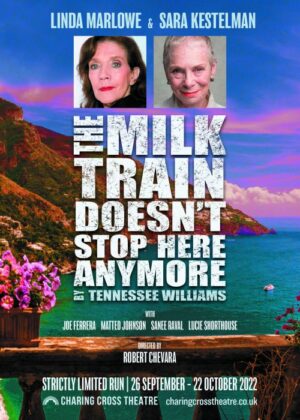The Milk Train Doesn’t Stop Here Anymore at Charing Cross Theatre

Two of Tennessee Williams’s most revered plays bookend the second half of 2022: Hollywood star Amy Adams made her West End debut in May in the writer’s much-loved memory play The Glass Menagerie; Normal People star Paul Mescal will portray Stanley in what is arguably the playwright’s most famous and enduring work – A Streetcar Named Desire – at the Almeida in December. Those two plays were written in the 1940s, when Williams was at his creative peak. He went on to enjoy further commercial and critical success throughout the following decade, with plays such as Cat on a Hot Tin Roof, Suddenly Last Summer and Sweet Bird of Youth cementing the writer as one of the all-time greats.
The 60s saw him enter more experimental territory, while wrestling with alcoholism and ever-increasing bouts of depression in his personal life. 1963 brought the death of partner Frank Merlo, which triggered heavy drug use that plagued Williams for the remainder of his life. He was subsequently never able to replicate his earlier successes in the theatre. Incidentally, 1963 also saw the premiere of The Milk Train Doesn’t Stop Here Anymore, which failed to ignite interest in audiences and critics alike. Very rarely performed, the play sadly exemplifies the creative downfall of one of America’s best-loved writers.
As in many of Williams’s works, a fading Southern Belle is at the centre. In this case she takes the form of Flora Goforth (Linda Marlowe), residing on the Italian Riviera while dictating her memoirs. She is visited by the so-called “angel of death”– a drifter known for frequenting the residences of wealthy widows who are approaching the end of their lives. An old rival, “the Witch of Capri” – played exceptionally by Sara Kestelman – also shows up on the scene. Long and drawn-out speeches then dominate the piece, with Flora reflecting on death and questioning the meaning of life and her place in the world.
While both Marlowe and Kestelman get to flex their impressive acting chops. Marlowe has some particularly enthralling and energetic scenes, but, ultimately, not even they can save the writing of Tennessee Williams’s down period. The performances are strong; however, the actors are simply not given enough to excavate from the material and audience engagement falters.
The result is a meandering misfire. It’s no real surprise that the play has only ever seen brief runs during its lifetime, but one must question why director Robert Chevara has decided to take it on. Fans of Williams might be intrigued and satisfied to see a lesser-known work being revived, however, most would likely agree that this should probably remain hidden away in the writer’s back catalogue.
Jonathan Marshall
Photo: Nick Haeffner
The Milk Train Doesn’t Stop Here Anymore is at Charing Cross Theatre from 26th September until 22nd October 2022. For further information or to book visit the theatre’s website here.

























Facebook
Twitter
Instagram
YouTube
RSS